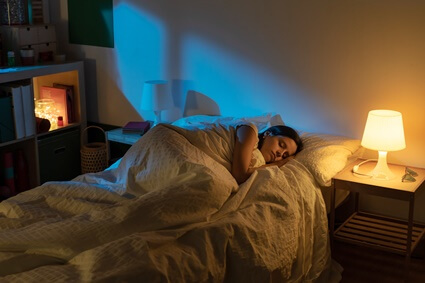Last Updated on August 19, 2023 by Louise Carter
Life can be hectic. As essential as sleep is, it can feel like it gets in the way. Sleeping every 48 hours rather than 24 hours may seem like a good idea if you lack sufficient time to achieve your goals.
In reality, sleeping every couple of days is harmful. The human body struggles to function on 4 hours of sleep a night. Imagine how much damage you’ll do if you skip sleep entirely.
We should always strive to sleep for 8 hours a night, but this isn’t always possible. Insomnia, shift working patterns, and health conditions can make this an unrealistic goal.
Even if you can’t sleep for a whole night, you should strive to get some sleep.
Only sleeping on alternate days may seem an effective way to catch up on your growing list of tasks and duties, but it’s an unsustainable lifestyle choice.
Why Am I Only Sleeping Every Other Night?
If you only get borderline sufficient sleep every other day, you likely have insomnia. According to the Journal of Clinical Sleep Medicine, 30% of adults have insomnia.
While insomnia is a common problem, it doesn’t mean it should be ignored. Sufficient daily sleep is vital because the body must repair itself from the wear and tear of everyday life.
If you only sleep every other day, you’ll deny yourself enough time to recuperate, leading to sleep debt. The more sleep debt you accrue, the more serious the consequences.
If your sleep cycle of only resting every other day isn’t a choice but something imposed upon you by insomnia, you must take steps to understand the cause.
Here are the most common explanations for only sleeping every other night:
Self-Trained Sleep Cycles
As much as the body craves daily sleep, it can be trained to accept a different cycle.
For example, if you work shift patterns, the body may be unaccustomed to sleeping daily, so it’ll resist any attempts to sleep until a scheduled rest period.
The only way to manage this is to create a healthy, reliable sleep routine for the mind and body.

Confused Circadian Rhythms
Circadian rhythms within the body govern sleep patterns. These instincts, usually directed by the sun, tell us when to wake up and go to sleep.
The circadian rhythms can lose balance when exposed to permanent artificial light. If you’re sleeping alternate nights, consider what you do in the build-up to bedtime and if this can be modified.
Stress
Stress and anxiety are the most common reasons people struggle to sleep at night.
The British Journal of Health Psychology explains that stress at work is among the leading causes of insomnia. Other causes include family problems, worries about debt, and health concerns.
If you’re stressed, the body remains hyperaroused, even when trying to sleep. This will cause you to lie awake at night, your mind racing with problems and their potential outcomes.
Even the most stressed person will likely manage to sleep every other day. Eventually, exhaustion will take hold, and your body will succumb.
Stress exerts pressure on the heart, earning it the name of the silent killer. The journal Chest links insomnia to heart disease.
Is Sleeping Every Other Day Bad?
You may feel that sleeping every other day is okay when you’re young, but as The Lancet explains, sleep debt must be repaid, which takes time.
What Happens if I Sleep Every Other Day?
The longer you sustain a sleep pattern of only resting every 48 hours, the more problems you’ll encounter. One night of insufficient sleep means they can’t fully function.
If your sleep cycles are so erratic that you’re only dozing every other day, you’ll become a danger to yourself and those around you.
The longer you go without resting, the more significant the impact on the body and mind.
You may not recognize these symptoms after one instance of missing a night of sleep. However, the ramifications will become increasingly apparent if you maintain this lifestyle.
| 24 hours without Sleep: | This has similar symptoms to consuming alcohol above the legal driving limit. As you enter a new day, having not slept the night before, you’ll be clumsy and likely experience muscular tremors. You’ll feel tired, finding interactions with people irritating. |
| 36 hours without Sleep: | Your mind and body will struggle to communicate, leading to slow reflexes and reaction times and a lack of motor skills. You’ll find it hard to absorb new information and will likely become increasingly forgetful. You’ll also experience physical symptoms, like increased inflammation and unrelenting hunger. |
| 48 hours without Sleep: | You’ll be weary to the point that you start falling asleep on the spot for a few moments, known as microsleep. You’ll struggle to make decisions, be short and irritable, and lack strength and essential motor function. |
| 72 hours without Sleep: | Microsleeps will get longer, lasting several minutes at a time. You’ll likely begin hallucinating, lacking perception of your surroundings. Your thoughts will be disordered to incoherent, and you’ll likely depersonalize from experiences. |
Even if you’re busy, working late, or your mind is occupied, some sleep is better than none. Waiting 48 hours for your next rest isn’t the right option.
How To Encourage Nightly Sleep
Even if you’ve convinced yourself that you’re okay sleeping every other day, that’ll eventually change. As your sleep debt grows, so will the repercussions. This means you must find a way to sleep daily.
That doesn’t involve forcing yourself to go to bed and lay there, staring at the ceiling until morning. If you’re struggling with insomnia, consult a healthcare professional.
Before prescribing sleep medication, most doctors suggest trying these steps:
Welcoming Sleep Environment
The first step should be to make your bedroom as welcoming as possible.
Avoid spending time in the bedroom unless you’re sleeping. If you psychologically associate the bedroom with wakeful activity, such as watching TV, your brain may resist sleep.
Get the most comfortable mattress and pillow possible. Paint the walls a calming color that encourages rest, as some shades are better for sleep than others.
The human body falls asleep considerably faster when temperatures are lower, so switch the air conditioning on or open a window. If that’s not an option, consider sleeping without a blanket.

Build a Routine
Sleep hygiene is building a routine in the hour before you go to sleep.
If you practice this routine nightly, it’ll eventually reap dividends. The body and mind will receive sleep-related messages encouraging you to sleep. The main aspects of sleep hygiene include:
- Minimize the use of screens at night. Reading a book is better than watching TV.
- Lower your body temperature by wearing thinner clothing, showering, or soaking your feet.
- Keep lights low in the home, as prolonged exposure to bright light confuses the circadian rhythms.
- Find a way to relax and unwind your muscles and mind, like meditation.
You may have a few nights where the sleep routine achieves comparatively little. Remain patient because this will help you transition from sleeping every other night to sleeping nightly.
Make Lifestyle Adjustments
If you’re only sleeping every 48 hours, you’re making lifestyle choices that reflect a near-permanent state of exhaustion. Minimize the use of artificial pick-me-ups like caffeine, and get some exercise.
This approach may lead to short-term difficulty, so clear your schedule. Take a day off work, and don’t attempt to drive a car or operate heavy machinery.
Train the body to thrive on sleep, not stimulants.
Sleep in Shifts
Consider breaking your sleep into slots. If 8 hours of unbroken sleep eludes you, you can still sleep every day without spending the entire night in bed.
Keep a sleep diary and acknowledge how many hours of sleep you get. If you get 4 hours, get the other 4 hours during the day as one long daytime sleep or a series of naps.
Seek to eventually transition into one monophasic sleeping pattern where you sleep once daily. However, getting 8 hours of sleep remains preferable to only sleeping every second day.
Limiting our sleep to every 48 hours isn’t a sustainable lifestyle, regardless of how you feel. Eventually, this lack of sleep will catch up with you because the body and mind need daily rest.







